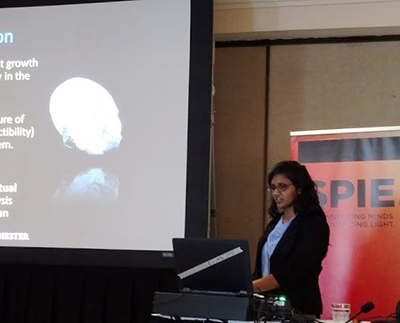Adora D’Souza and Anas Abidin received travel grants from the Wismüller Lab for attending the SPIE Medical Imaging 2016 conference in San Diego, California, where five scientific papers had been accepted for publication. We contributed four oral presentations entitled (i) Mutual connectivity analysis (MCA) using generalized radial basis function neural networks for nonlinear functional connectivity network recovery in resting-state functional MRI, (ii) Large-scale Granger causality analysis on resting-state functional MRI, (iii) Investigating Changes in Brain Network Properties in HIV-Associated Neurocognitive Disease (HAND) using Mutual Connectivity Analysis (MCA), and (iv) Detecting altered connectivity patterns in HIV associated neurocognitive impairment using Mutual Connectivity Analysis.
In addition, we presented a poster entitled Assessing vertebral fracture risk on volumetric quantitative computed tomography by geometric characterization of trabecular bone structure.

Adora presenting at SPIE Medical Imaging.